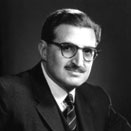“Canada has traditionally been referred to as a ‘middle power’. Why could Canada not be home to a world-class prize with an international jury drawn from Canada, Britain and the United States.”
—Lionel Gelber

Lionel Gelber
If there were a Lionel Gelber Prize back in 1938 a Canadian scholar in his twenties would have been a solid contender for the award. He was on a Rhodes Scholarship to Oxford University when he wrote a book titled The Rise of Anglo-American Friendship: a Study of World Politics 1898 to 1906. The young scholar was Lionel Gelber.
It was a typical Gelber work, displaying scholarship and prescience, examining the rise of American global power, with all the risk, hope and complexity such a geopolitical shift entailed at the beginning of the 20th Century. It was followed by Peace by Power: The Plain Man’s Guide to the Key Issues of the War and the Post-War World (1942) and America in Britain’s Place (1961). Crisis in the West: American Leadership and the Global Balance (1975), continued Gelber’s thoughts on the theme he began as a student at Oxford.
It was another 50 years before the launch of the Lionel Gelber Prize, awarded to the world’s best non-fiction book in English (or English translation) that seeks to deepen public debate on significant global issues. The Economist has described the Lionel Gelber Prize as “the world’s most important award for non-fiction.” It is worth $50,000.
Gelber distinguished himself as an author, scholar, historian, diplomat and was a recognized authority on Anglo-American relations. During a lifetime of 82 years, he wrote eight books and contributed articles on foreign relations and politics to many journals. His dedication to his work, recalls his niece, together with his penchant for formal attire and his stately manners made him a formidable personality in a family of accomplished individuals.
The Gelber family arrived in Canada from Eastern Europe in the late 19th Century. Lionel Gelber was born on October 13, 1907 in Toronto. His father, Louis, prospered in the garment industry, and young Lionel made good use of his inheritance. He studied at Upper Canada College, then the University of Toronto, where he won the Rhodes and settled comfortably in at Balliol College at Oxford. He spent the rest of his life alternating between London, New York and Toronto, gaining a reputation as an original thinker and a scholar passionately devoted to world issues.
Gelber was a staunch internationalist. He became a friend of British Prime Minister Sir Anthony Eden, attended the opening of Leonard Bernstein’s West Side Story in Manhattan, and revered Winston Churchill. He also had passionate loathings, such as what he called “judgments out of context,” which is how he regarded Lord Moran, Churchill’s physician, who wrote about a Churchill in decline, not the Churchill Lionel Gelber considered one of the greatest individuals of the 20th Century.
Prime Minister John Diefenbaker named Gelber as a special adviser, which did not make Gelber popular among the careerists in the Department of External Affairs. The Gelber-Diefenbaker alliance didn’t last long, but Gelber always professed admiration for Diefenbaker’s intellect.
As for the Lionel Gelber Prize, from conception to launch, Gelber considered it a natural for a country such as Canada.
“Canada has traditionally been referred to as a ‘middle power,'” Gelber said, coining the phrase. “Why could not Canada be home to a world-class prize with an international jury drawn from Canada, Britain and the United States.”
When he announced the prize in 1989, Lionel’s brother Arthur Gelber said, “International relations and global politics have an impact on all of us. This prize is designed to stimulate authors who write about international relations and to encourage the audience for these books to grow.”

